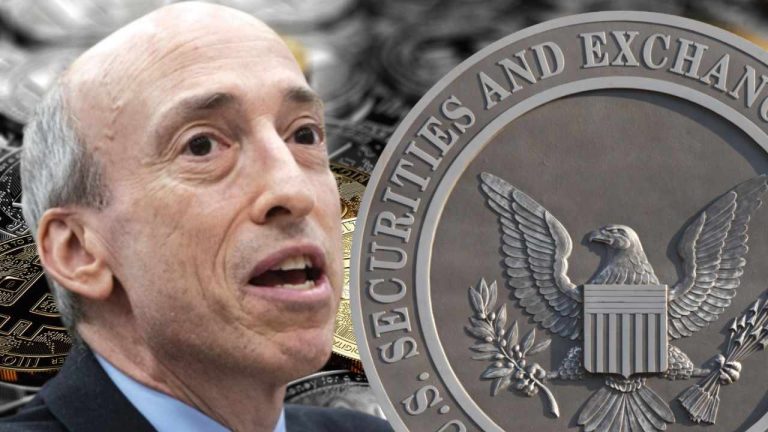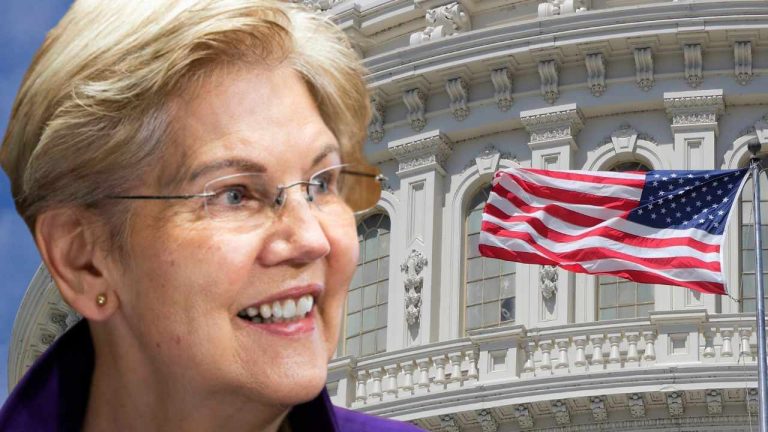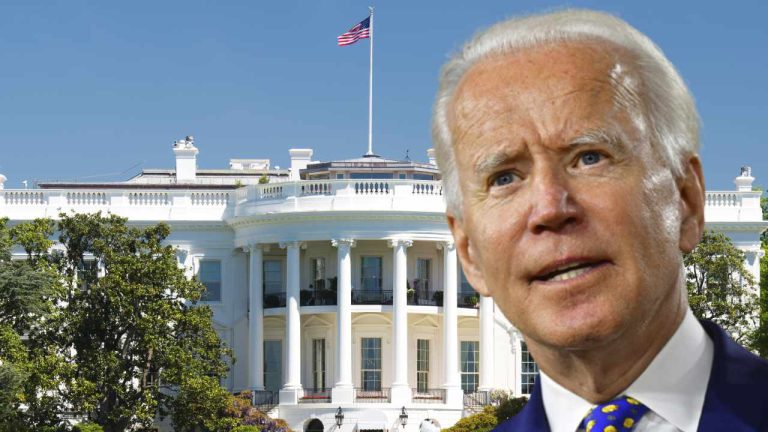 U.S. Securities and Exchange Commission (SEC) Chairman Gary Gensler has proposed amending federal custody rules to cover “all crypto assets.” The SEC chief said: “Though some crypto trading and lending platforms may claim to custody investors’ crypto, that does not mean they are qualified custodians.” Gary Gensler Proposes Including Crypto in Expanded Custody Rules The […]
U.S. Securities and Exchange Commission (SEC) Chairman Gary Gensler has proposed amending federal custody rules to cover “all crypto assets.” The SEC chief said: “Though some crypto trading and lending platforms may claim to custody investors’ crypto, that does not mean they are qualified custodians.” Gary Gensler Proposes Including Crypto in Expanded Custody Rules The […]
Massachusetts Senator Elizabeth Warren is pushing forward with a political campaign to regulate the crypto space, an industry that she and her coalition believe threatens national security. According to a report from Politico, Warren is making national security the focus of her potential crypto legislation but is also citing other issues like consumer protections, sanctions […]
The post Senator Elizabeth Warren Launching Anti-Crypto Army in Washington, Says Industry Is for Money Laundering: Report appeared first on The Daily Hodl.
 On Feb. 14, 2023, Milena Mayorga, the Salvadoran ambassador to the United States, announced that her country is considering opening a second bitcoin embassy in the Lone Star State. Mayorga said that Texas is “our new ally” and the goal is to expand “commercial and economic exchange projects.” Ambassador Milena Mayorga Fosters Growing Relationship Between […]
On Feb. 14, 2023, Milena Mayorga, the Salvadoran ambassador to the United States, announced that her country is considering opening a second bitcoin embassy in the Lone Star State. Mayorga said that Texas is “our new ally” and the goal is to expand “commercial and economic exchange projects.” Ambassador Milena Mayorga Fosters Growing Relationship Between […]
A slew of technical, fundamental, and on-chain indicators hint at more pain for BNB price in February.
On Feb. 13, Binance's native token, BNB, recorded its worst daily performance since November 2022, falling 8.5% to below $285. BNB price has since recovered to over $298, but its possibility of facing another selloff remains high. Let's take a look at a few reasons why.
The ongoing decline in BNB's price came as a part of a broader rising wedge breakdown.
Notably, on Feb. 9, BNB broke out of its rising wedge pattern, a bearish reversal setup that forms as the price trends upward inside a range defined by two ascending, converging trendlines.

As a rule of technical analysts, a rising wedge's profit target is measured after subtracting the maximum distance between the pattern's upper and lower trendline from the breakdown point.
Therefore, BNB's rising wedge target comes to be near $250, down about 15% from current prices. Interestingly, the $250 level has also served as support in May, September and November 2022.
The selloff pressure in the BNB market escalated primarily due to the U.S. Securities and Exchange Commission's (SEC) crackdown on crypto company Paxos.
The regulator has accused Paxos of issuing and listing Binance USD (BUSD) — a Binance-branded stablecoin — which it deems an unregistered security. Paxos has categorically denied the allegation, noting that it would go to court, if necessary.
But markets have become fearful after this news. For instance, the number of addresses holding between 1,000 and 10 million BUSD dropped dramatically since Feb. 13, dumping over $207 million in stablecoins, based on data from Santiment.

"This is an astounding level of stablecoin dropping, especially while the other three stablecoins (Tether, USD Coin, Dai) have been seeing big holder accumulations," noted Santiment, adding that the ramifications of the SEC lawsuit have been pushing BNB price lower.
"It also is seeing a month-high in trading volume as its price has dropped, meaning there is a higher probability of the plummet potentially continuing."

From an on-chain perspective, BNB holding sentiment has weakened across all address cohorts, which includes both small (fishes) and large investors (whales and sharks).
Related: Binance and Huobi freeze $1.4M in crypto linked to North Korean hackers
Notably, the number of addresses holding 0.001 to 10 million BNB dropped significantly in January 2023 and has been unable to recover since. This increases the token's possibility of continuing its downtrend in February.

On a brighter note, the number of addresses holding 10,000-100,000 BNB tokens has recovered modestly, indicating some whales have been buying the dip.
Santiment concedes that the ongoing downtrend may not extend in the longer run, saying the SEC crackdown may be "a short-term FUD event."
Excerpts:
"Yes, it's possible that this is one of those instances where people panic and everything returns to normal for Binance by Friday [Feb. 17]."
This article does not contain investment advice or recommendations. Every investment and trading move involves risk, and readers should conduct their own research when making a decision.

Crypto financial service Matrixport’s head of research believes regulators are not targeting all stablecoins with the regulatory crackdown on BUSD issuer Paxos.
Crypto financial services Matrixport's head of research believes the recent scrutiny of Paxos and its Binance USD (BUSD) token is not a direct attack on stablecoins themselves.
In a Feb. 14 analysis, Matrixport's Markus Thielen suggested that Paxos Trust Company, the issuer of the Binance USD (BUSD), may not have been stringent enough with its oversight of the token.
He added that the issue "does not appear to be around stablecoins" in itself.
"Paxos had violated its obligation to conduct tailored, periodic risk assessment and due diligence of Binance and Paxos-issued BUSD customers," Thielen argued.
On Feb. 13, the New York Department of Financial Services (NYDFS) ordered Paxos to halt the issuance of BUSD "as a result of several unresolved issues related to Paxos’ oversight of its relationship with Binance"
Paxos also recently confirmed that on Feb. 3, the United States Securities and Exchange Commission (SEC) sent a Wells notice to the stablecoin issuer over its alleged failure to register the offering under federal securities laws.
Thielen notes that BUSD has issued $11 billion on Ethereum, but $4.8 billion is also accounted for to be issued on the Binance Smart Chain, in a tokenized version of BUSD.
"It appears that NYDFS is now worried that the $4.8 billion might not be properly backed or have had issues with being 1:1 backed," he said.
However,Paxos has stated as recently as Feb. 13, that, “BUSD tokens issued by Paxos Trust have and always will be backed 1:1 with US dollar-denominated reserves, fully segregated and held in bankruptcy remote accounts.”
In a statement to Cointelegraph, Binance reiterated this stance, saying, "BUSD is a 1 to 1 backed stablecoin that is one of the most transparent stablecoins in existence.”
Thielen notes some of the regulatory actions could have also been sparked by the Jan. 24 incident when Binance mixed customer funds with collateral.
The recent actions against BUSD have still caused some to believe that other stablecoins could be in trouble.
Paxos recently stated that besides the current issue around BUSD, “there are unequivocally no other allegations against Paxos.”
Meanwhile, USD Coin (USDC) issuer Circle’s Chief Strategy Officer and Head of Global Policy Dante Disparte told Cointelegraph:
"Circle maintains that USDC is a regulated dollar digital currency issued as stored value under U.S. money transmission law."
"Facts and circumstances in any type of regulatory action like this are all different, as are the structural and regulatory considerations with each of the cryptocurrencies that are in circulation around the world," Disparte added.
Related: Paxos ‘categorically disagrees’ with the SEC that BUSD is a security
Thielen has however urged the industry not to be overly concerned about the future of BUSD.
"Binance has shot itself a little bit in the foot here, but they are working on it and it should be resolved. So should we be really worried?" Thielen said.
"I don't think so. Is the peg breaking? NO. We are no longer in a bear market where you worry about downside, in bull markets, you focus on the upside," he added.

Ethereum may experience a drop in user activity alongside ETH price with crypto staking in the crosshairs of the SEC.
Ethereum's native token, Ether (ETH), saw its worst daily performance of the year as the U.S. Securities and Exchange Commission (SEC) stopped Kraken, a cryptocurrency exchange, from offering crypto staking services.
On Feb. 9, Kraken agreed to pay $30 million to settle the SEC's allegation that it broke securities rules by offering crypto staking services to U.S. retail investors.
The news pushed down the prices of many proof-of-stake (PoS) blockchain project tokens, in particular. Ethereum, which switched to a staking-based protocol in September 2022, also suffered as a result.
On Feb. 9, ETH's price plunged nearly 6.5% to around $1,525, the largest single-day decline since Dec. 16 of last year.

The SEC's crackdown on crypto staking begins as Ethereum awaits the release of its key network upgrade, dubbed Shanghai, in March.
The update will finally allow Ether validators — entities that have locked approximately $25.6 billion worth of ETH tokens in Ethereum's PoS smart contract — to withdraw their assets alongside yield rewards.
As a result, multiple analysts, including Bitwise Asset Management's Chief Investment Officer, Matt Hougan, consider Shanghai a bullish event for Ether.
"Today, many investors who would like to stake ETH and earn yield are sitting on the sidelines. After all, most investment strategies can’t tolerate an indefinite lock-up," wrote Hougan in his letter to investors in January, adding:
"So, most investors stay out of the market. But once that indefinite lock-up is removed, the percentage of investors willing to stake their ETH will explode."
But doubts have been emerging about the future of crypto staking in the U.S., with Brian Armstrong, the CEO of Coinbase crypto exchange, fearing that the SEC would ban staking for retail investors in the future.
1/ We're hearing rumors that the SEC would like to get rid of crypto staking in the U.S. for retail customers. I hope that's not the case as I believe it would be a terrible path for the U.S. if that was allowed to happen.
— Brian Armstrong (@brian_armstrong) February 8, 2023
Moreover, some analysts argue that the ban of Ether-staking services will force users to move away from Ethereum.
Notably, Ethereum requires stakers to deposit 32 ETH (~$50,000) into its PoS smart contract to be a validator. As a result, retail investors often use third-party staking services that pool smaller amounts of ETH to enable validator status.
"If the SEC bans crypto staking for the public, then a majority of Ethereum validators will have to come down," argues independent analyst Ripple Van Winkle, adding:
"Because you need 32 ETH to stake. Which means the ETH network is going to experience issues."
From a technical perspective, Ether price is positioned for a potentia 20% price correction in February.
Related: Bitcoin price hits 2-week low amid warning $22.5K loss means fresh dip
Notably, on the daily chart, ETH price has been undergoing a pullback move after testing its multi-month descending trendline as resistance. It now holds the 200-day exponential moving average (200-day EMA; the blue wave) near $1,525 as support.

Ether risks dropping below the 200-day EMA support wave owing to its negative market fundamentals. Such a scenario includes the next downside target at $1,200, which coincides with a multi-month ascending trendline support.
This article does not contain investment advice or recommendations. Every investment and trading move involves risk, and readers should conduct their own research when making a decision.

Crypto firms in the United Kingdom could face some harsh punishments under the FCA's proposed financial promotions regime.
Newly proposed advertising rules in the United Kingdom could potentially see executives of crypto firms face up to two years of prison for failing to meet certain requirements around promotion, according to the U.K. financial watchdog.
In a Feb. 6 statement, the U.K. Financial Conduct Authority (FCA) revealed that if the proposed "Financial promotions regime" is approved by Parliament, all crypto firms in the country and overseas would have to follow certain requirements when advertising their crypto services to U.K. customers.
“Cryptoasset businesses marketing to UK consumers, including firms based overseas, must get ready for this regime,” said the FCA.
"Acting now will help ensure they can continue to legally promote to U.K. consumers. We encourage firms to take all necessary advice as part of their preparations," it added.
Under the FCA's proposed regime, crypto firms would need to either have authorization from the FCA to advertise their services or have an exemption under the Financial Promotion Order.
According to the regulator, there are only four routes in which a "cryptoasset business" can promote its services to customers in the United Kingdom:
The regulator said that any promotion made outside of these routes will be in breach of the Financial Services and Markets Act 2000 (FSMA), which carries a criminal punishment of up to two years of imprisonment.
"We will take robust action where we see firms promoting cryptoassets to UK consumers in breach of the requirements of the financial promotions regime," the FCA said.
Related: British authorities split on banning sale of crypto investment products
Other than potential prison time for its execs, firms caught violating the new regime could face having their website taken down, public warnings, and other enforcement actions.
At this stage, the FCA has said they will await the "relevant legislation" to publish "our final rules for crypto asset promotions," possibly indicating the financial promotions regime could see updates or changes.
"Subject to any changes in circumstances, we expect to take a consistent approach to crypto assets to that taken in our new rules, in place from Feb. 1 2023, for other high-risk investments," the FCA said.

The bankruptcies of once high-profile crypto players are “painful” but helpful said Michael Saylor but added industry oversight is still needed.
High-profile crypto bankruptcies and a hearty price crash are necessary evils to help the industry grow, while greater regulation is a must, according to Microstrategy co-founder Michael Saylor.
In a Feb. 3 interview on CNBC’s Squawk on the Street, Saylor opined on potential incoming United States crypto regulation after the bankruptcy of FTX, saying:
“The crypto meltdown was painful in the short term, but it's necessary over the long term for the industry to grow up.”
He added the industry “has some good ideas” — implying the Bitcoin (BTC) Lightning network — but added some in the space “implemented those good ideas in an irresponsible fashion.”
Today’s interview with @MorganLBrennan covered the success of @MicroStrategy, global adoption of #Bitcoin and #Lightning⚡️, the evolution of the crypto industry, and the digital transformation of money. pic.twitter.com/bEnLOVbpiJ
— Michael Saylor⚡️ (@saylor) February 3, 2023
Saylor said the crypto space needs direction from entities long-involved in the traditional financial markets and input from regulators — in particular the Securities and Exchange Commission (SEC).
“What [the industry] needs is adult supervision. It needs the Goldman Sachs’ and the Morgan Stanley's and the BlackRock’s to come into the industry. It needs clear guidelines from Congress. It needs clear rules of the road from the SEC.”
This “meltdown,” according to Saylor, educated many on crypto while simultaneously revealing that it’s “time for the world to provide a constructive, transparent framework for digital assets” so the financial system can move “into the 21st century.”
Saylor also responded to criticisms leveled by Charlie Munger, the vice chair of insurance and investment firm Berkshire Hathaway, saying the 99-year-old investment veteran should take time to study Bitcoin.
On Feb. 1, Munger opined that crypto is “not a currency, not a commodity, and not a security” instead calling it “gambling” and believing the U.S. should “obviously” bring in laws to ban crypto.
Related: Film review: ‘Human B’ shows a personal journey with Bitcoin
Saylor agreed Mungers crypto-criticism wasn’t “totally off” but there are “10,000 crypto tokens which aren’t gambling,” adding:
“Charlie and the other critics, they're members of the Western elite and they're continually prodded for an opinion on Bitcoin and they haven't had the time to study it.”
He added if Munger “spent 100 hours studying” Bitcoin then “he would be more bullish on Bitcoin than I am.”
Saylor pointed to emerging markets such as Lebanon, Argentina and Nigeria which have high crypto-use rates and use cases spanning from inflation hedging to remittances.
“I've never really met someone [...] that spent some time to think about it that wasn't enthusiastic about Bitcoin.”
 U.S. Senator Elizabeth Warren has called on Congress to ensure regulators, such as the Securities and Exchange Commission (SEC), have the tools to regulate the crypto industry effectively and crack down on crypto money laundering activities. “The current legal structure essentially holds up a giant sign over crypto that says, money laundering done here,” the […]
U.S. Senator Elizabeth Warren has called on Congress to ensure regulators, such as the Securities and Exchange Commission (SEC), have the tools to regulate the crypto industry effectively and crack down on crypto money laundering activities. “The current legal structure essentially holds up a giant sign over crypto that says, money laundering done here,” the […] The White House has published a “roadmap to mitigate cryptocurrencies’ risks.” The roadmap calls for authorities to “ramp up enforcement where appropriate” and Congress “to step up its efforts” to regulate the crypto sector. It also notes that legislation should not greenlight mainstream institutions “to dive headlong into cryptocurrency markets.” ‘The Administration’s Roadmap to Mitigate […]
The White House has published a “roadmap to mitigate cryptocurrencies’ risks.” The roadmap calls for authorities to “ramp up enforcement where appropriate” and Congress “to step up its efforts” to regulate the crypto sector. It also notes that legislation should not greenlight mainstream institutions “to dive headlong into cryptocurrency markets.” ‘The Administration’s Roadmap to Mitigate […]